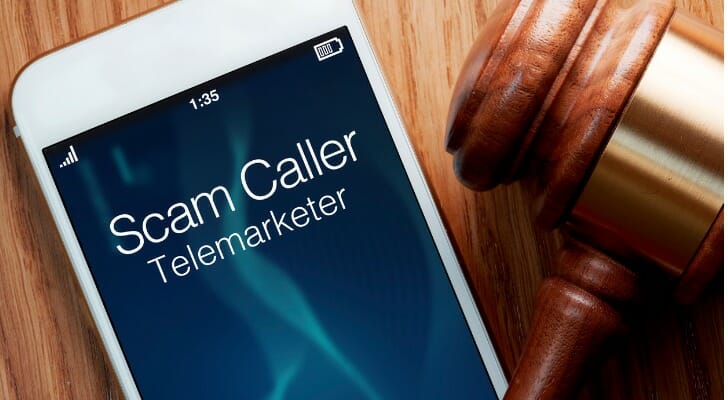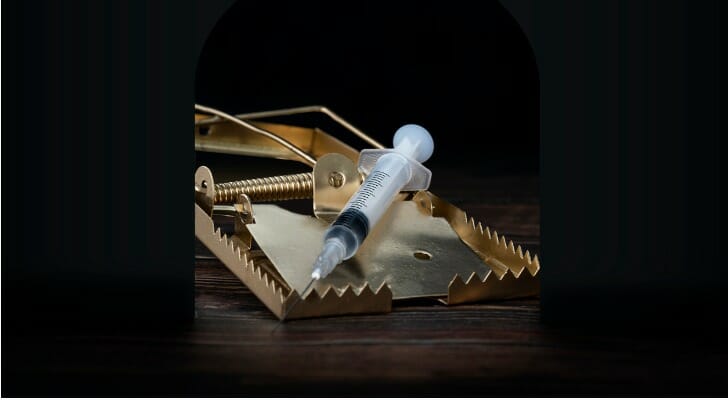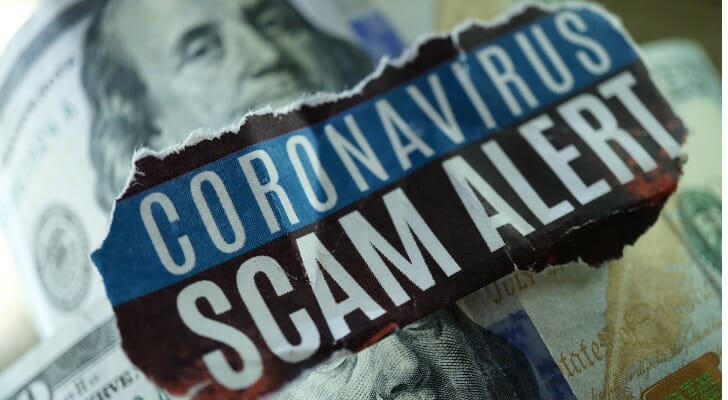 Many tragedies bring out scammers looking to take advantage of fear and suffering. The coronavirus pandemic has been no exception, with a litany of scams targeting those living in fear of the virus or struggling with its economic impacts. A general rule of thumb is to never provide personal information to people contacting you who you don’t know, unless you can independently verify that they need it for a legitimate reason. We highlight some of the biggest scams, and how to avoid them.
Many tragedies bring out scammers looking to take advantage of fear and suffering. The coronavirus pandemic has been no exception, with a litany of scams targeting those living in fear of the virus or struggling with its economic impacts. A general rule of thumb is to never provide personal information to people contacting you who you don’t know, unless you can independently verify that they need it for a legitimate reason. We highlight some of the biggest scams, and how to avoid them.
Coronavirus Stimulus Check Scams
Due to the Coronavirus Aid, Relief, and Economic Security Act (CARES) Act, millions of Americans will be receiving a one-time stimulus check of up to $1,200 in the coming weeks, with many people already receiving those payments. Couples can receive up to $2,400 and families will get an additional $500 per underage child.
This is an opportunity for scammers to call, email, or text you, claiming to be government officials. They may say they need you to verify your bank account information, or other personal information before you can receive your stimulus check. Don’t provide it. You’ll get the stimulus money without giving anyone any information. The Treasury Department is going to use the information on file from your taxes to directly deposit or mail your check. The only place you may be asked to provide further information is on the IRS website. The IRS will never call you asking for personal information.
Charity Scams
Although there are many real charities doing excellent work , some scammers create fake charities. The fake charity might even have a name that is similar to that of a real charity. Before donating, do some research to make sure the organization is legitimate, and that you’re donating through their website.
Fake charities might ask you to send money via wire transfer, gift cards or are cash-only. Real charities take checks or credit cards, both of which are safer ways to pay. Even if the charity seems legitimate and takes checks and credit cards, you should still verify the charity and make sure you’re donating through the charity’s actual website. Charity Navigator, CharityWatch and the Better Business Bureau’s Wise Giving Alliance are sites where you can check to make sure you’re donating to a legitimate charity.
You might also receive calls or emails from scammers pretending to be with a legitimate charity. They will ask for donations on behalf of the organization, but the charity will never see the money. Do not provide any personal information on the phone or via email. Instead, donate directly through the charity’s website.
Coronavirus Cure and Treatment Scams
 You might receive an email offering a preventative measure, cure, vaccination or home test kit for coronavirus. You might see one of these products advertised or even sold in a store. However, at this time, there are no FDA-authorized home test kits for the coronavirus. There are also currently no vaccines, pills, tinctures, lozenges, lotions or products that will treat or cure coronavirus – whether prescription or over-the-counter.
You might receive an email offering a preventative measure, cure, vaccination or home test kit for coronavirus. You might see one of these products advertised or even sold in a store. However, at this time, there are no FDA-authorized home test kits for the coronavirus. There are also currently no vaccines, pills, tinctures, lozenges, lotions or products that will treat or cure coronavirus – whether prescription or over-the-counter.
Some of these phony offerings may come from religious groups or religious figures. You can check the FDA’s website for any updates. The FDA and Federal Trade Commission have been working to get fake cures off store shelves by issuing warnings to sellers of unapproved or mislabeled products claiming to treat COVID-19.
Scammers trying to sell fraudulent cures or vaccines specifically target high-risk individuals, like the elderly or those with underlying health conditions. If you receive a robocall offering a free coronavirus test kit or a cure of some kind, hang up. Scammers may even request your personal information and payment over the phone.
If you get an email for one of these products or something similar, do not click on any links or attachments. At best, it is a product that does not work. At worst, you may download a virus onto your computer, which could harvest your online account logins, passwords, and credit card and bank details.
Scammers might even call and pretend to be doctors or medical providers, and tell you they are treating a family member for coronavirus, but need payment for treatment. Check with any family members if you get a call like this. If your family member is in the hospital for coronavirus, call the hospital directly and confirm they called you before making any payments. Additionally, check with your insurance company and your family member’s insurance company – the treatment may be covered.
Fake Quizzes
There have been reports of quizzes circulating on social media that claim to test a person’s knowledge of coronavirus and the impact of the pandemic. In reality, they are a means to get personal information associated with confidential online transactions.
This might be the name of one’s first pet, mother’s maiden name, family information as well as contact details. Once the scammer gets this information, it can be used to facilitate identity fraud, such as resetting a bank account password.
Social Security Scams
Social Security scams were around before coronavirus. But with the additional fear and uncertainty, scammers might think now is the right time to trick you into giving up personal information, by claiming they need to suspend your checks due to suspicious behavior. Or they may use coronavirus itself as a reason to claim your checks have been suspended.
You might receive a letter, phone call, or email telling you that your benefits will be suspended unless you call a certain number, or pay a fine or fee. Social Security benefits will not be suspended due to coronavirus, so if you receive a communication suggesting that, ignore it and report the scam to the Social Security Office of the Inspector General. In addition, the Social Security Administration will not ask you for personal information over the phone, by email, or by mail, so be wary if you receive a request like this. If you think the request may be legitimate, contact the Social Security Administration directly to find out if they have contacted you, or if it is a scammer.
Smartphone and Phishing Scams
 Some malicious text messages promising to track the spread of coronavirus in real time are circulating. However, the app, if downloaded, can listen to you through your microphone, watch you through your smartphone camera, and read your messages. According to cybersecurity experts, this is a customized version of a type of spyware called SpyMax. Don’t respond to odd text messages from numbers you don’t know, and don’t click on any links or attachments they send.
Some malicious text messages promising to track the spread of coronavirus in real time are circulating. However, the app, if downloaded, can listen to you through your microphone, watch you through your smartphone camera, and read your messages. According to cybersecurity experts, this is a customized version of a type of spyware called SpyMax. Don’t respond to odd text messages from numbers you don’t know, and don’t click on any links or attachments they send.
You can protect yourself from phishing scams in general by never opening an attachment or clicking on a link from someone you don’t know. If the link is from someone you do know, but it looks odd for them to have sent it, contact them in another way to confirm they intended to send it to you. It is always prudent to install and update good cybersecurity software on your devices to ensure you are protected from the newest malware and threats.
Sometimes internet scammers use domain names that sound legitimate, like “covid19” or the American Red Cross, according to the FBI, which lists seven common traits of scams.
The Bottom Line
Although many people are doing excellent work right now to mitigate the effects of coronavirus, some see this crisis as an opportunity to make a profit. Do your own research and independent verification before giving anyone your money. When in doubt, call organizations or individuals directly to confirm the call was on their behalf, and wasn’t a scammer. If you receive a phone call, letter, or email that sounds suspicious, you can help stop fraudsters by reporting it to the Federal Communications Commission (FCC).
Tips for Financial Security
- A financial advisor can be a great resource during times of economic uncertainty. Finding the right financial advisor who fits your needs doesn’t have to be hard. SmartAsset’s free tool matches you with financial advisors in your area in five minutes. If you’re ready to be matched with local advisors who will help you achieve your financial goals, get started now.
- The government is offering various types of financial aid to those affected by the pandemic. One is providing stimulus checks. If you’re struggling to meet your rent or mortgage payments, check out our information on coronavirus rent and mortgage relief.
Photo credit: ©iStock.com/Bill Oxford, ©iStock.com/sefa ozel, ©iStock.com/Kameleon007